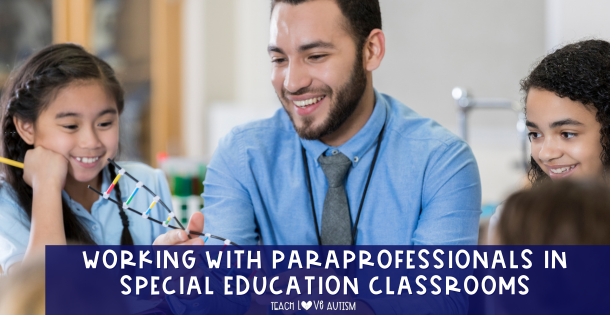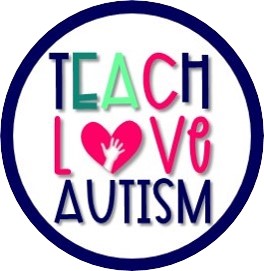Unlocking Success: Working with Paraprofessionals

When you studied special education, did you ever really realize you’d be working with paraprofessionals, too? I know I didn’t! One thing I truly wish I had learned in my teacher prep program in college is how to effectively supervise, manage, train, and delegate to my paraprofessionals. We NEED them. They truly are our right and left hands. But what about those paraprofessionals that just aren’t as….natural? The ones who need a lot of guidance? The ones who aren’t self-starters? The ones who tend to spend a lot of time in off-topic conversations or scrolling around on their phones? What then?
My years working with paraprofessionals in special education have been filled with ups and downs, and I have learned a lot along the way. Every year we manage to figure it out, however, it can cause a lot of stress on you as a teacher to feel like you are getting the most out of the staff in your classroom.
Working with Paraprofessionals: Learn their Strengths and Weaknesses

Often we don’t ask paraprofessionals what they are good at or prefer doing. All of us like working on projects that fill our buckets! Maybe you have a para that would love to prep work tasks or one that really feels confident in helping students de-escalate. Be sure to check in! While we can’t always do everything that’s our preference all the time, making an effort to include those preferred tasks into their daily schedule can really make a difference.
Creating a Schedule to Support Working with Paraprofessionals

Schedules aren’t just for students! Creating an individualized daily or weekly schedule for your paraprofessionals can be so grounding for them. It’s hard to be asked to do things at a moment’s notice all of the time – giving a schedule of start and end times, break times, and all the in-betweens can be helpful. Bonus points if your schedule helps paras understand what you’re expecting them to be doing, and with who! (Example: Handwriting with Peter, supervise Kaila doing independent work)
Constantly Show Your Gratitude
Something that can often be overlooked when working with paraprofessionals is showing gratitude. It can be awkward to shower your paraprofessionals with gifts, but a little love goes a long way. A handwritten note and a cup of Dunkin coffee can brighten the day of a hardworking para! Are they always washing their hands? Keeping a bottle of lotion or their favorite soap by the sink is really a sweet gesture. Here’s a few more ideas!
- Personalized Thank-You Notes: Write and give handwritten notes expressing specific appreciation for their contributions to the classroom.
- Gift Cards: Provide a small gift card to their favorite coffee shop, restaurant, or store as a token of appreciation.
- Special Lunch or Coffee Break: Treat them to lunch or bring in their favorite coffee or snacks for a relaxing break together.
- Personalized Gifts: Give a thoughtful gift like a custom name badge, mug, or tote bag with a meaningful message or their name on it.
- Recognition Board: Create a “Paraprofessional of the Month” board in the classroom or staff room to highlight and celebrate their efforts and achievements.
Working with Paraprofessionals: Ask for Their Input!
Just because our paraprofessionals aren’t case managers or licensed special educators doesn’t mean they don’t have info to share about our students. Before IEP meetings asking for their input on student strengths and growth areas can be helpful. I also love this idea from Little Miss Kim’s Class: have paras write a few sentences about what they love about the student on a piece of paper. Bring these to their IEP meeting and read them, and give them to the student’s parent/guardian! IEP meetings often can be hard for parents and allowing para input to brighten their day can be a really nice touch.
Be a Model for Paraprofessionals

Whatever we want our paraprofessionals to do, we need to model it. Stay off your phones? Make sure you are, too! Take quality data? Make sure you are, too – and show it to them as an example of what you’re looking for! I also think it’s important to model all the tasks that you are asking your paraprofessionals to do in your classroom. Think of this just like you would model expected behavior for your students, do it for your paras too! I think if done with respect and maintaining dignity you can grow your paraprofessionals the most by modeling.
A Solution to Get You Started!
What if I could help you with doing all these things with a base resource to get the ball rolling and to be able to get your staff ready to work in your classrooms? You don’t have to think of all this on your own! Take a look at the Special Education Paraprofessional Binder with print-and-go ready materials and editable ones too!



In conclusion, effective teamwork is crucial when working with paraprofessionals in the classroom. Establishing a clear procedure for training them not only enhances their contributions but also creates a more cohesive learning environment for students. By utilizing available resources, special education teachers can streamline this process and foster collaboration that benefits everyone involved. Check out related resources to enhance your approach and support your paraprofessionals effectively!
Amplify Learning Potential: Building Strong Partnerships with Paraprofessionals






